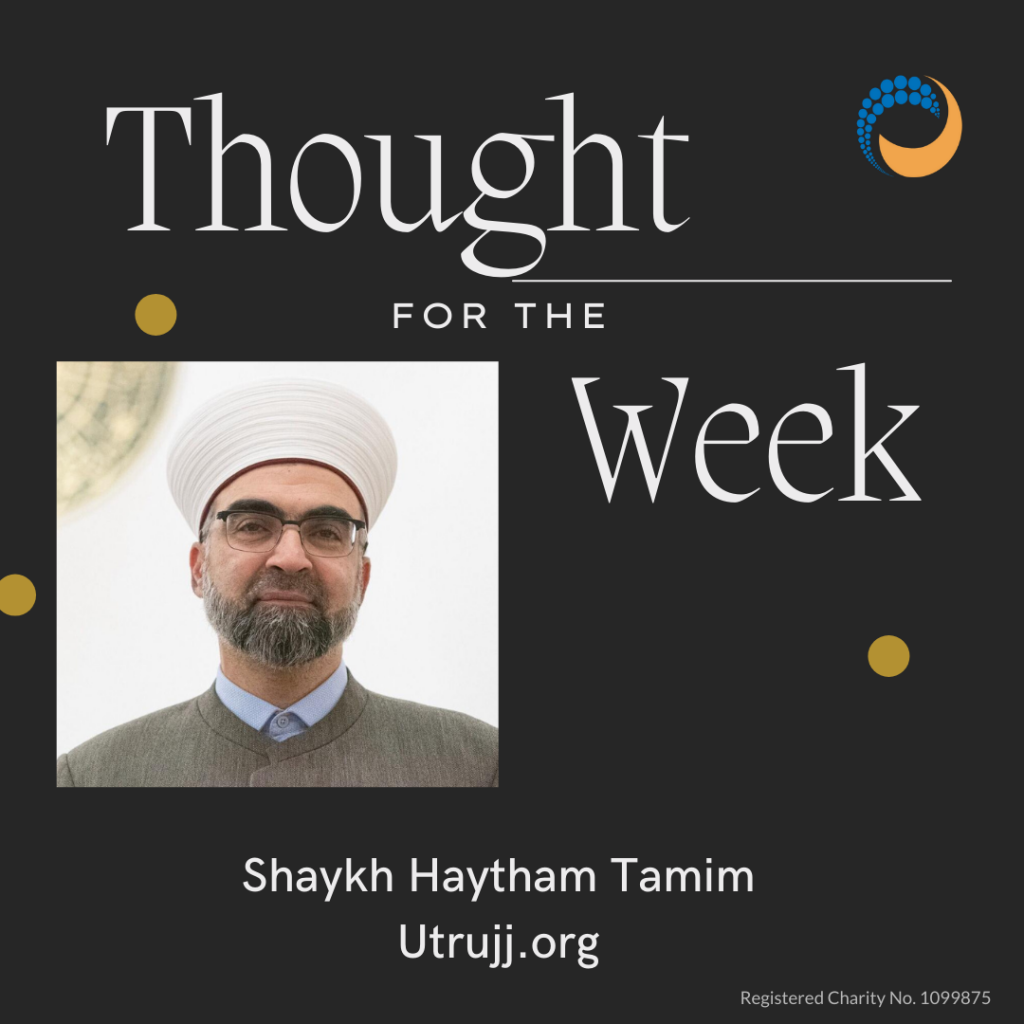Laylatul Qadr and the reward of congregational worship

Focus on Allah
Aisha (may Allah be pleased with her) stated that in the last ten days of Ramadan, the Prophet (peace be upon him) would spend the night in prayer, and wake up his family so they could also pray and worship Allah. Our focus on the last ten nights should be worshipping Allah. The Prophet (peace be upon him) would isolate himself in a tent Aisha would erect for him with bamboo sticks in the mosque. And he would stay awake all night.
عَنْ عَائِشَةَ ـ رضى الله عنها ـ قَالَتْ كَانَ النَّبِيُّ صلى الله عليه وسلم إِذَا دَخَلَ الْعَشْرُ شَدَّ مِئْزَرَهُ، وَأَحْيَا لَيْلَهُ، وَأَيْقَظَ أَهْلَهُ.
With the start of the last ten days of Ramadan, the Prophet (peace be upon him) used to tighten his waist belt (i.e. work hard) and used to pray all the night, and used to keep his family awake for the prayers.[Bukhari].
Exert yourself
‘Tighten his belt’ means he would exert himself in his worship and refrain from intimacy with his wives. Nothing would distract him from worshipping Allah in these nights, and would not let anything obstruct his connection and dedication at this time.
He would stay away from his wives, even Aisha to whom he was so close.
If we can do etikaf, that is good, but if we cannot we should spend at least one night in worshipping, if possible the night of 27th Ramadan. While fasting restricts our eating and drinking, eitikaf restricts our communication with others. It is about minimising our whims and desires during the day and maximising our time and one to one communication with Allah during the night.
Reflect
The companions who described his salah (peace be upon him) said he would never recite a verse without reflecting on it – if it was about mercy he would seek Allah’s mercy and if it was about punishment, he would cry and seek Allah’s protection for his Ummah from that punishment. He was not merely reciting but activating the verses.
His worship was not restricted to salah, but he also engaged in other forms of ibadah as well.
The reward of Laylatul Qadr
The reward of Laylatul Qadr is the equivalent of 1000 months of worship as stated in Surat Al Qadr:
The Night of Decree is better than a thousand months. [97:3]
The rewards of praying in congregation
If possible, go to the mosques and pray in congregation as there is even more reward for praying in congregation.
Al-Khatib Al-Baghdadi narrated on the authority of Anas that whoever prayed Laylat al-Qadr for Isha’ and Fajr prayer in congregation has taken from Laylat al-Qadr the ample share.
Uthman bin ‘Affan (may Allah be pleased with him) reported:
عن عثمان بن عفان رضي الله عنه قال: سمعت رسول الله صلى الله عليه وسلم يقول: ”من صلى العشاء في جماعة، فكأنما قام نصف الليل ومن صلى الصبح في جماعة، فكانما صلى الليل كله” ((رواه مسلم)).
I heard the Messenger of Allah (ﷺ) saying:
“One who performs ‘Isha’ prayer in congregation, is as if he has performed Salat for half of the night. And one who performs the Fajr prayer in congregation, is as if he has performed Salat the whole night.” [Muslim]
Uthman b. ‘Affan reported the Messenger of Allah (may peace be him) as saying;
عَنْ عُثْمَانَ بْنِ عَفَّانَ، قَالَ قَالَ رَسُولُ اللَّهِ صلى الله عليه وسلم “ مَنْ صَلَّى الْعِشَاءَ فِي جَمَاعَةٍ كَانَ كَقِيَامِ نِصْفِ لَيْلَةٍ وَمَنْ صَلَّى الْعِشَاءَ وَالْفَجْرَ فِي جَمَاعَةٍ كَانَ كَقِيَامِ لَيْلَةٍ ” .أبو داود.
If anyone says the Isha’ prayer in congregation, he is like one who keeps vigil (Qiyam in prayer) till midnight; and he who says both the Isha’ and Fajr dawn prayer in congregation is like one who keeps vigil (Qiyam in prayer) the whole night. [Abu Dawoud]
What should you recite?
Aisha (may Allah be pleased with her) said she asked God’s Messenger (peace be upon him) to tell her what prayers to say on Laylat al-Qadr if she knew which night it was, and he told her to say:
وَعَنْ عَائِشَةَ رَضِيَ اللَّهُ عَنْهَا قَالَتْ: قُلْتُ: يَا رَسُولَ اللَّهِ أَرَأَيْتَ إِنْ عَلِمْتُ أَيُّ لَيْلَةٍ الْقَدْرِ مَا أَقُولُ فِيهَا؟ قَالَ: ” قُولِي: اللَّهُمَّ إِنَّكَ عَفُوٌّ تُحِبُّ الْعَفْوَ فَاعَفُ عَنِّي “. رَوَاهُ أَحْمد وَابْن مَاجَه وَالتِّرْمِذِيّ وَصَححهُ.
“O God, Thou art forgiving and lovest forgiveness, so forgive me.” [Ahmad, Ibn Majah and Tirmidhi]
Attain forgiveness
The greatest reward of Laylatul Qadr is having your sins forgiven, but these are minor sins so if anyone has major sins, these are deleted by doing tawbah.
Abu Hurayrah (may Allah be pleased with him) reported that the Prophet (peace be upon him) said:
وعن أبي هريرة رضي الله عنه، عن النبي صلى الله عليه وسلم قال: “من قام ليلة القدر إيمانا واحتسابًا غفر له ما تقدم من ذنبه”. ((متفق عليه)) .
“Whosoever performs Qiyam during Laylat-ul-Qadr (Night of Decree), with faith and being hopeful of Allah’s reward, will have his former sins forgiven.” [Bukhari and Muslim]
Ziyad related to me from Malik that he had heard that Said ibn al-Musayyab used to say:
عَنْ مَالِكٍ، أَنَّهُ بَلَغَهُ أَنَّ سَعِيدَ
بْنَ الْمُسَيَّبِ، كَانَ يَقُولُ مَنْ شَهِدَ الْعِشَاءَ مِنْ لَيْلَةِ الْقَدْرِ فَقَدْ أَخَذَ بِحَظِّهِ مِنْهَا . الموطأ.
“Whoever is present at Isha on Laylat al-Qadr has taken his portion from it.” [Muwatta’]
We ask Allah Almighty to enable us to witness Laylatul Qadr and receive its tremendous blessings, complete forgiveness and abundant reward. Ameen.
Khutbah Shaykh Haytham Tamim147th April 2023.
Related posts
Heavenly Food – All you want to know about Laylatul Qadr – Utrujj
Eitikaf
Women in the mosque
Ramadan – a month of internal and external victories – Utrujj
When do you have to make the intention to fast?
How much is fidya and kaffarah?
TARAWIH & SALAH
Is it permissible to pray tarawih online
Can you hold the mushaf while praying?
How many rakahs should I pray for Tarawih?
What’s wrong with a super speedy tarawih?
How do you perform witr?
Should I recite the Fatiha behind the imam?
How do you perform sujud al sahw
Do you have to make up a missed salah?
What is the significance of the ayatul kursi?
What is the significance of the Darood?
What is the significance of the atahiyat in the salah?
RECITING THE QURAN
Why is the Quran transformative?
How do you perform Sajda Tilawah?
How important is it to fix your tajweed?
DUA
Why should I keep making dua?
- Climbing the stairs. How to continue your spiritual journey post-Ramadan
- How Allah strengthens the hearts of believers
- Why should you follow up one good action with another one?
- Don’t be a Ramadani person – Be a Rabbani person.
- How do you pray Salat al-Kusuf – the prayer during a solar eclipse

Recommended Posts

How Allah strengthens the hearts of believers
April 19, 2024

Don’t be a Ramadani person – Be a Rabbani person.
April 10, 2024

